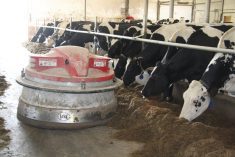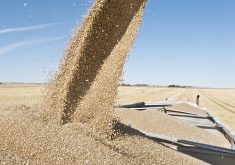Alberta beef producers who pay a $3 checkoff on every animal sold in the province may request a refund twice a year.
Provincial legislation requires the organization to issue refunds to producers who request it starting April 1. The Alberta Beef Producers will continue to collect the money and delegates to the organization’s annual meeting Dec. 7-9 in Calgary agreed to changes to operate under the new regime. The changes also reflect the province’s commitments to national beef organizations like the national cattle research council, Beef Information Centre and Canada Beef Export Federation.
Read Also

Soybean market still figuring out implications of China-U.S. pact
Soybean futures had a muted reaction to the U.S. trade deal with China as the market tries to figure out the nuances of the deal.
“With a refundable checkoff, Alberta Beef Producers will have to change their agreements with the national checkoff agency and will only submit $1 for every dollar they keep,” said Adrienne Waller, legal counsel to ABP.
Delegates debated whether to ask the province to retain the $1 national checkoff as a mandatory portion, but a federal-provincial agreement would be needed to get the $1 set aside as non refundable, said Mike Pearson, manager of the Agricultural Products Marketing Council.
“The recent direction is that this would not be permitted at this time,” Pearson said.
The Alberta marketing council is the supervisory body for the province’s commissions within the department of agriculture.
Producers who request a refund must submit their claims between July 1 and July 31 for cattle sold, fed or slaughtered between Jan. 1 and June 30 and between Jan. 1 and Jan. 31 for cattle sold, fed and slaughtered between July 1 and Dec. 31.
They must also submit records to show animals were traded and should receive their rebates within 90 days. They will also receive the full $3 per head even though dealers and auction markets will continue to deduct five cents for administration costs. The beef producers cannot collect an administration fee to manage the refund work.
ABP expects that refund cheques would be mailed to producers who requested them within three months. People who miss a claim period cannot request the refund unless there are extenuating circumstances. That is common among all the commissions in the province, said Waller.
Delegates also debated, but defeated, resolutions about handling the checkoff and how the loss of funds may affect future programs.
In the 2008-09 fiscal year, ABP collected more than $13 million in levies and used the money to fund beef promotion, research, lobbying, legal bills and national organizations like the Canadian Cattlemen’s Association.
The next budget will be $5 million. Money was pulled from existing reserve funds. Any net revenue collected after April 1, 2010, will be safeguarded for the 2011-12 budget year when all refunds have been made.
Delegates defeated a resolution to have the Livestock Inspection Agency collect the checkoff and administer refund requests. It was suggested the brand inspection agency could handle the work because it already has a large database of people who buy and sell cattle. Others saw it as a move to undermine the ABP.
“We are in a situation where ABP’s powers and democratic ability have been seriously eroded. I see this as further weakening of its position,” said delegate Ted Ford of Westlock.
A resolution asked to publish the names of those who request the levy refund but that is not allowed under privacy legislation.
Other resolutions proposed a system where the money is collected once rather than every time an animal is marketed, but that could require an increase to the levy. Some suggested it could be collected when people buy their animal identification tags.















